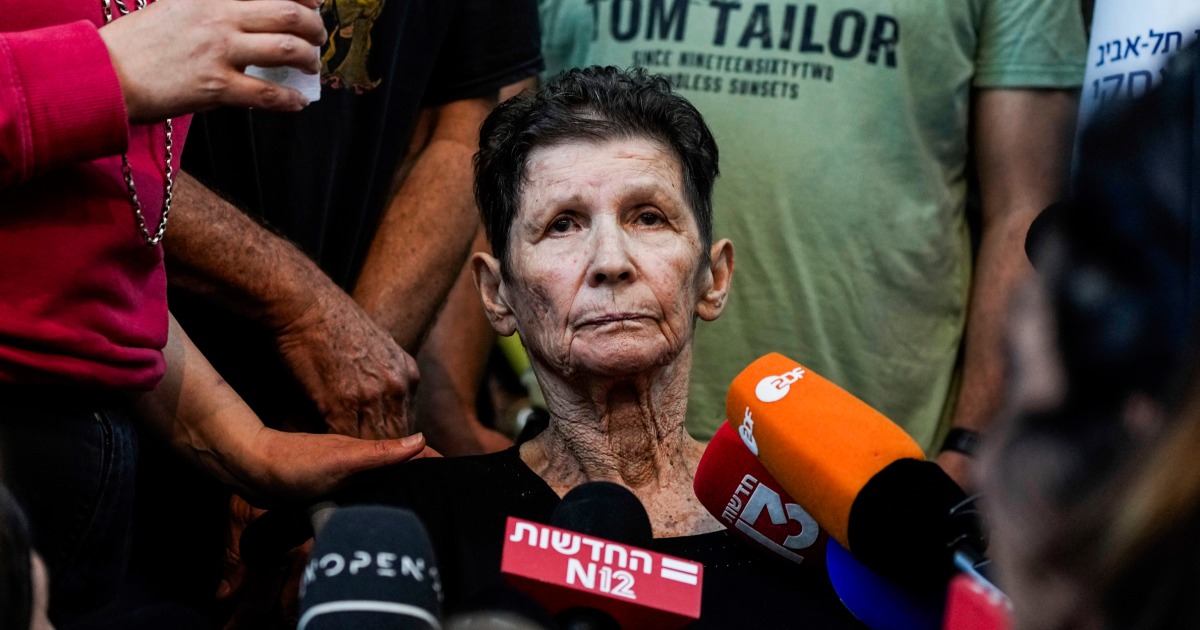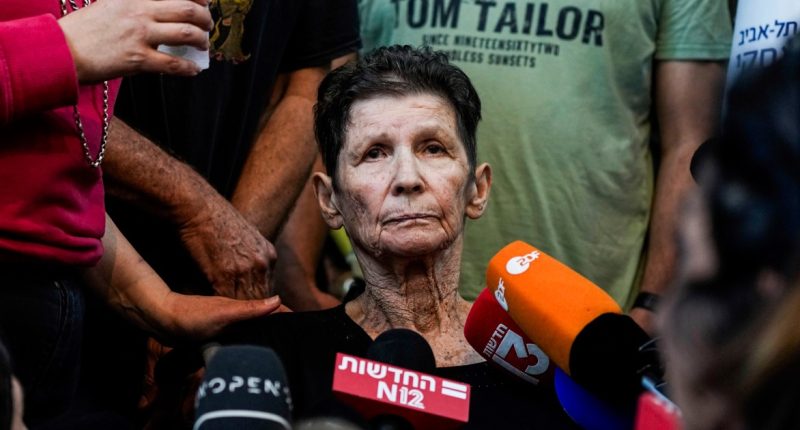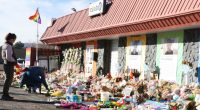
TEL AVIV — Amid a tumult of grief and calls for vengeance, one victim has offered a remarkable — and controversial — gesture of peace toward the captors and killers who tore through her community.
Yocheved Lifshitz, 85, one of the Israeli hostages abducted by Hamas, was being released late Monday when, according to footage released by the militant group, she turned to one of the armed, balaclava-clad militants, shook the person’s hand and uttered one word: “shalom” — a Hebrew salutation meaning “peace.”
“I went through hell,” Lifshitz said back at a hospital in Tel Aviv early Tuesday.
Her captors beat her in the ribs with sticks, she said, making it difficult to breathe. She was visibly exhausted and physically worn. But she told reporters that she offered the handshake because the Hamas militants “were gentle with us” while she was imprisoned in the “spider web” of tunnels under the Gaza Strip.
Lifshitz said the fighters, whose group is banned as a terrorist organization in the United States, were “very kind” and “took care of all of our needs” — from making sure they were well-fed to cleaning their toilets and looking after their “female hygiene.”
Israeli officials have condemned the Hamas messaging around her release as nothing more than propaganda, while other observers pointed to the value Hamas may see in treating such a high-profile group of captives with care.
“The State of Israel is happy to see the beloved grandmothers at home, and thanks Egypt and the Red Cross for their assistance,” the Israeli government said Tuesday. But “it is important to refer to the media messages coming out of Hamas,” it added. “The issue of freedom of speech or press does not exist in Gaza. Hamas makes sure that anyone who deviates from its lines will bear the consequences,” it said.
Lifshitz, a peace activist helping transport Palestinians in Gaza to get treatment in Israeli hospitals, was taken hostage from Nir Oz. The kibbutz about a mile from Gaza was marauded by Hamas militants, who killed or abducted around a quarter of its residents, according to officials. Its isolated position meant it was an easy target for the extremists, who tortured families and burned people alive in their safe rooms, according to first responders who saw the carnage.
Her husband, Oded Lifshitz, a journalist and fellow peace activist, is still being held.
Lifshitz’s grandson, Daniel, told NBC’s “TODAY” show Tuesday that he “felt such a huge, huge, huge sting in my heart to see her in that situation, knowing that she’s been through so much.” But he called for continued international pressure to bring home the more than 200 remaining hostages, adding that seeing his grandmother returned made him “scared for all the people” still imprisoned.
Lifshitz’s outreach to her Hamas guards will seem beyond charitable to many Israelis. It could not be further from the desire expressed by many here for justice and retribution. The Hamas attack killed more than 1,400 people, a colossal figure in a small country where few if any have escaped grief on some level.
But while Israel has responded by bombarding Gaza, killing more than 5,000 people according to Palestinian health officials, it has so far relented from an expected ground invasion. The White House has been urging its regional ally to allow more time for humanitarian aid to enter the strip, as well as talks to free the hostages.
A kibbutzim peace activist
Even amid this talk of restraint, Lifshitz’s comments make her an outlier and perhaps more representative of the kibbutzim near Gaza, many of whose residents were progressive peace activists like her and more sympathetic to the Palestinian cause than many other Israelis.
“Many are center-left, many are activists, many have relations with Palestinians based on equality,” said Louis Fishman, an associate professor at Brooklyn College, and author of “Jews and Palestinians in the Late Ottoman Era 1908-1914, Claiming the Homeland.”
If her views are unsurprising for a kibbutzim peace activist, then so is Hamas’ good treatment of its captives, its main bargaining chip, he said.
“Of course that’s the priority of Hamas to take care of them to use in a prisoner exchange or something else,” Fishman said. “Yes, they were treated humanely, but the thing we need to emphasize first is the tragedy of her experience, the trauma she went through.”
Even before the psychological body blow the surprise Hamas attack dealt to their nation, only 15% of Israeli Jews supported the idea of negotiating with Hamas, according to polling released only last month by the Mitivim think tank. The most popular opinion, 30%, was the status quo: military “deterrence” in exchange for “calm.”
“Two decades ago, when there was hope for peace, there was a lot of cross border engagement,” said Nimrod Goren, president and founder of Mitivim. “That is gone.”
Nevertheless, Lifshitz, who along with her neighbor Nurit Cooper, 79, became the third and fourth captives released by Hamas, is not the first victim of terror to reject urges of reprisal.
In 1987 Northern Ireland, when an Irish Republican Army bomb killed 11 people including Marie Wilson, 20, her father, Gordon Wilson, told the BBC that he bore “no grudge” toward her killers and said he would “pray for those people tonight and every night.”
He went on to become an internationally renowned peace campaigner, and the incident is seen as a turning point in “the Troubles” conflict, which ended a decade later.
Pushing for an alternative response
Likewise in Israel, some of the people who lost most in Hamas’ attack are calling for a different approach.
Jonaton Zeigen, son of Vivian Silver, another peace activist also kidnapped in the attack, has been outspoken in disavowing the relentless Israeli bombardment of Gaza, which it says is targeting Hamas but has killed thousands of civilians, many of them children.
“I also want to yell and scream and kill, and that’s the easy, natural sentiment of humans,” he said in an interview with NBC News. “But it’s not the right thing to do.” He added that in Gaza “we need to stop the violence now. Vengeance is not a strategy. We need to negotiate, we need to get the captives out.”
Magen Inon, whose parents, Bilha and Yakov Inon, were killed by Hamas, has echoed a similar sentiment.
“People from both sides of the border have good reasons to hate one another,” he wrote last week. “But this cannot be the only option. My family does not seek revenge.”
Likewise Yaakov Argamani, whose daughter, Noa Argamani, was filmed being abducted on the back of a motorcycle, said he does “not blame anyone.”
“In Gaza, too, families are mourning their children,” he told Israel’s Haaretz newspaper. “What will a few more deaths achieve?”
Few if any Israelis would minimize what happened just more than two weeks ago, an event so devastating to the nation’s sense of security that it will take years to unpack and process. But for now the Lifshitz family seems to be focusing on bringing back more Israelis alive rather than seeking retribution.
Every person “who comes back is like a ray of light,” Daniel Lifshitz said. But single rays were not enough, he added, “we also need a sun.”
Source: | This article originally belongs to Nbcnews.com










